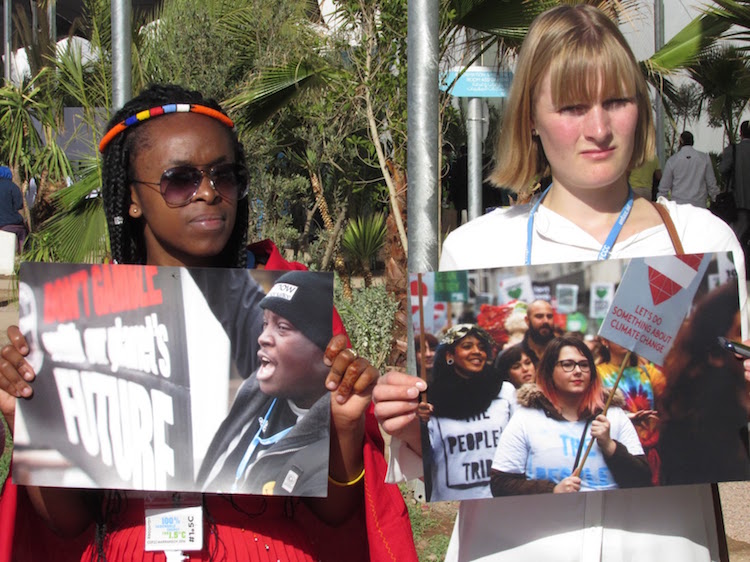By Fabíola Ortiz
MARRAKECH (IDN) – Establishing a clear path forward and including women and girls in global efforts on climate change were some of the biggest challenges the delegations and non-state actors faced at the latest United Nations Climate Change Conference in Marrakech.
Formally known as the Twenty-Second Conference of Parties (COP22), the conference had a special day (November 14) for discussing exclusively gender issues within the United Nations Framework Convention on Climate Change (UNFCCC).
“Study after study has shown that women are the most vulnerable to climate change and that’s why there is a need for strong leadership on this issue,” said UNFCCC Executive Secretary Patricia Espinosa.
“We need to prioritise women’s demands and offer the proper responses to climate change,” Mariam Diallo-Dramé, President of the Association of Women Leaders and Sustainable Development (AFLED) told IDN. AFLED is based in Bamako, Mali, and works to empower girls and young women between the ages of 15 and 35.
Diallo-Dramé explained that because adaptation to climate change is inextricably related to access to education, climate adaptation must therefore also envision a holistic solution of educating women and sending girls to school. “We work to empower girls’ citizenship and to involve them in decision-making, we encourage them to be part of political scenario in Mali,” she said.
Women in the Sahel region are responsible for the well-being of the family, often having to walk long distances to fetch water and food on unsafe roads, she noted, adding that “resources are rare in the Sahara region, and most of the time men leave women to farm. They have their own traditional methods for adaptation, but it is not enough, they need help.”
As an African voice advocating for gender issues to be included in the climate talks in Marrakech, Diallo-Dramé regretted that this issue was not being properly addressed in the negotiations.
“I have the feeling that in those high-level meetings we, African women from the Sahel, are going to stay behind because we are not there at the table. We are not able to address the gender issue in our countries, governments don’t understand, all legislation regarding gender and human rights is just on paper and is not being implemented. When you talk about climate justice it is going to be for the West and not for us,” she said.
For the last two weeks at COP22 (November 7-18, 2016), country delegations negotiated implementation of the new global agreement to tackle climate change adopted in Paris in 2015. The Paris Agreement embraces a language sensitive to gender equality and recognises Parties’ responsibility to respect and promote human rights obligations through climate change action calling for “gender-responsive adaptation measures and capacity-building activities”.
In Marrakech, Parties were expected to carry on with the Lima Work Programme on Gender – which is a two-year work programme on gender launched at COP20 in 2014. Civil society groups had strongly advocated a clear plan of action on gender within the UNFCCC and financial support for the activities under the Lima Work Programme.
“We start from the point that we are not victims, we are advancing now on the discourse of empowerment,” Maité Rodríguez Blandón, coordinator for the Guatemala Foundation in the Central American country, told IDN.
“Climate resilience will come from empowering women in their communities. Women are very well organised at the local level and they know their role. We focus on changing the perception from being a victim to becoming a key actor and protagonist for change.” Blandón leads the Women and Peace Network in Central America with grassroots women’s organisations from Nicaragua, Guatemala, El Salvador, Costa Rica and Honduras. Her work has focused on grassroots women’s movements struggling for land rights, women’s rights and safer cities for women over the past decade.She said that there was too much dialogue and not enough action at COP22.
“We have seen an increasing participation of indigenous and women’s groups that used to be unthinkable in the past. The Lima Work Programme on Gender was very short and you don’t see the mention of women empowerment in the text. It has evolved with no doubt, we have achieved higher levels of conscious, but we don’t want to be at the periphery. We need to see more concrete actions”, she stressed.
Engaging indigenous women’s voices has also been a concern for Victoria Tauli-Corpuz, the UN Special Rapporteur on the rights of indigenous peoples. “Indigenous women have a very important role because they are the ones who are really involved in subsistence low-carbon food production. They are the ones who take care of the environment within their territories. Their role is to really ensure that the biodiversity is sustained,” she told IDN.
Tauli-Corpuz believes that COP22 did have a strong gender focus.“Women are here to make sure that their rights will also be addressed in the decisions being reached. Indigenous women are the strong allies for climate change solutions, they should be at the core of the discussions,” she said.
Civil society organisations and non-state actors had a crucial role in COP22, Driss El Yazami, Head of the Civil Society Team at the conference and President of the National Human Rights Council of Morocco, told IDN.
“Women’s groups from several countries gathered here to lay the first foundations of an African Network of Women for Climate Justice. Reaching the Paris Agreement was itself influenced by civil society and non-state actors. The Paris Agreement recognises the important engagement of the various actors, including non-governmental organisations,” she added.
Around 1,500 local and regional leaders representing more than 780 local and regional governments from 114 countries gathered in Marrakech and launched a roadmap for action to start a global campaign to localise climate finance in 2017 and implement a ‘Global Action Framework for Localising Climate Finance’ by 2020. [IDN-InDepthNews – 18 November 2016]
Photo credit: Fabiola Ortiz | IDN-INPS
IDN is flagship of the International Press Syndicate.

